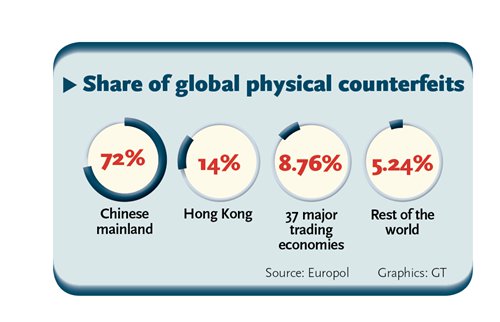
(Graphics/GT)
Experts suspect allegations not backed by convincing data
The European police agency's recent accusation that China is the main source for global fake goods does not stand up to scrutiny, as China has beefed up efforts in protecting intellectual property rights (IPR) and cracking down on counterfeiting, experts said on Thursday.
"Europol's allegation is irresponsible, and the accuracy and objectivity of the data needs to be further investigated," Sun Jiwen, the spokesperson for the Ministry of Commerce (MOFCOM), said at a press briefing in Beijing on Thursday.
The comment comes after the Europe's police agency published a report on June 22 claiming that the Chinese mainland and Hong Kong "together are estimated as the source for 86 percent of global physical counterfeiting, which translates into $396.5 billion worth of counterfeit goods each year."
Physical counterfeiting accounts for the equivalent of 12.5 percent of Chinese mainland's exports of goods and over 1.5 percent of its GDP, said the 74-page report, jointly produced by the Madrid-based EU Intellectual Property Office, adding that intellectual property theft was "one of the most lucrative criminal enterprises."
In response to the allegation, Sun said, "The Chinese government has always paid high attention to stamping out counterfeit goods and IPR violations in imports and exports, and has strengthened supervision in such areas."
For example, China launched a campaign dubbed "Qingfeng" in April 2015, aiming to crack down on IPR infringement cases and selling fake products as exports, according to Sun, adding that the campaign has achieved significant results after two years of work.
In the first four months of 2017, customs authorities have seized 930,000 shipments of goods suspected of IPR infringement. The country's quality watchdog has also seized more than 425,000 items including clothes, luggage, toys and electric products that did not meet the quality standard for exports.
Besides, the country has set up three specialized intellectual property courts in Beijing, Shanghai and Guangzhou, a move indicating that China has been making efforts to improve intellectual property protection during recent years, Chang Yachun, a lawyer specializing in IPR issues at Beijing Kangda Law Firm, told the Global Times on Thursday.
Many domestic companies have realized the importance of protecting intellectual property, particularly when they expand overseas, said Chang. "China has seen robust growth in patent applications during recent years."
In terms of international patent applications, the number of applications from China increased by 44 percent in one year, according to the Xinhua News Agency in March, citing World Intellectual Property Organization Director General Francis Gurry.
In addition to government efforts, China's online platforms have also joined the trend.
E-commerce giant Alibaba has so far rolled out a batch of measures that punish counterfeit sellers, including purging them from the platform based on big data technology and blacklisting them from using credit products under its financial arm Ant Financial, according to a statement Alibaba sent to the Global Times on Thursday. Last year, the platform assisted police in more than 1,400 counterfeit cases.
In terms of the report, experts also raised questions about whether the data collected is convincing.
"It's very hard to get the samples to calculate the proportion of domestic fake goods in the global market," Li Chang'an, a professor at the Department of Public Economics at the University of International Business and Economics, told the Global Times on Thursday. "
It may be convincing that they have figures for fake Chinese products in Europe, "but it is suspicious that they calculated fake products in China and even China's share of global fake products," Zhao Ping with the China Council for the Promotion of International Trade was quoted as saying in a Xinhua report on Wednesday.
Indeed, the EU is probably choosing a protectionist stance over trade policy, said Li, noting that the report could bring a negative impact to China-made products.
"The EU still has prejudice against Chinese products," Bai Ming, a research fellow at the Chinese Academy of International Trade and Economic Cooperation, told the Global Times on Thursday.


















































